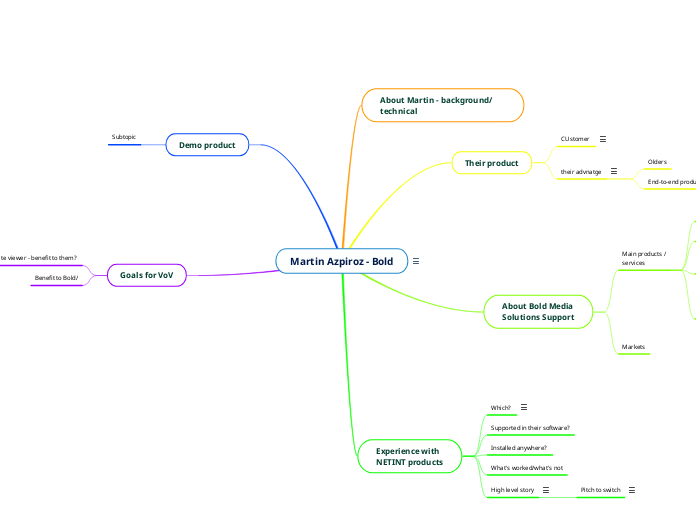Martin Azpiroz - Bold
zer:Welcome to NETINT's Voices of Video, where we explore critical streaming-related topics with the experts who create and implement new streaming-related technologies. Today, we talk with Martín Azpiroz, a director at Bold MSS, who are systems integrators focused on providing new end-to-end solutions to pay TV, Internet service providers and Telcos.Today we'll be talking about how choosing an encoder can affect signal quality and robustness, particularly when receiving the signals via satellite. Thanks for joining us martin,
About Martin - background/ technical
Their product
CUstomer
Offer to telcos, pay tv operators, ISPs, all of them. but main consumer are paytv - migrating to the web - from cable TV to OTT. planing this year to go outside their region - incorporating company in the US - will offer Today - all Latin American - planning to go abroad and are opening company in the states. Olders
their advnatge
Offer the whole ball of wax -- could be more companies that do that - Only think we don't do in the workflow - Have niagra DRM - use that - don't develop DRM
Olders
End-to-end product
About Bold Media
Solutions Support
Main products /
services
Consulting
Hardware?
Services
SaaS
Consulting
software
Transcoding?
Live
VOD?
Markets
Experience with
NETINT products
Which?
Dozens of systems Which NETINT products testedT408/T432/Quadra15 days to integrate hardware into their platform - quite smooth-Make some changes because use Sharif - deinterlacing on CPU - Quadra. Using FFmpeg - since 2011 - very customized - good engineering team- lots of knowledge of video and streaming - Not just for transcoding - handle video. PowerQuality - Stability - most important -way better performance than CPU. CPU is most stable - but power consumption is inasme for multiple channelsNETINT hardware - live input comes from saeillite - lots of issues - storms, many things - need to be resilient - taking input first - a lot of clock issues - IRDis - changes between timingingEngineering team can answer better - more stable that CPU - same channel - CPU/ASIC - microcuts - 5 per hour with CPU, 1 per hour with ASICTo do: Will send
Supported in their software?
Installed anywhere?
What's worked/what's not
High level story
talking about - experience in the region - how they adapt their solution to the problems that are.Satellite - HBO - disney - ESPN/Fox/ all the content powers -their customers cable TV operators (like DirectTV)Live events, movies, news channels, pay tv channels. DBC - MPEG TS over satellite - Receiver - provided by programmer - sign with HBO - send satellite - with receiver - can use streaming to ingest. Fiber or network Take the streaming that comes from that IRDIS Itermiediate receiver decoder - attached to satellite antenna - 264/265 - usually. UDP - MPTS - can be SDI - local channel - from cable from the studio - another input - OK from studios and content owners to use CMS - for trasncoding of VOD files - LSD (live streaming) to work in secure environment - VOD encoding - NETINT - the same.
Pitch to switch
Why the switch - when to recommend:when does it make sense New customers - standard product - ASIC - only version ofSecondcustomer using servers from 5 years agoEnergy - high temperature, 70% of capacity, should replace at 5 years in that environment- even with proper housing- running at 70-80% replaceThird - Adding channels / replacing - many channels - this year - deploy 20 in 4K - hardware you have doesn't allow that - need to upgrade - can buy a server just for the new channels or upgrade the whole system - their advice - How did they learn about meet NETINT - Randal at NAB -- IBC - was introduced but don't remember - met Randal - NAB - contacted Fernando - no business card from booth - talked to Fernando>> Randal. Older customers - if they want 4K content, they need more hardware capacity - that's where NETINT enters in the upgrade plan.platform works with 4K even with GPU but usually don't have sufficient capacity - Used GPU - NVIDIA - Pascal to currentNETINT compared to - CPU - most software encoding CPU - best quality - even better than NETINTThroughput isn't sufficient - power too high - can see 2 CPUs - 2/3 channels - five profiles - server costs $6,000 - same server [ut a quadra - can process Put low quality on throughput on CPU - GPU - throughput/quality/power efficiencyGPU - beats -- deinterlacing- MBTS - several satellites per provider - Universal, disney, AMC - 30% or moreWork with 265 - but mobile devices - can't do 265 - don't both in parallel - doubles their bandwidth and processing requiring - once phone replacements - subscribers will have 6 year old phones with no 265 decode. CPU - on mobile for HEVC - drains batter - so, keep with 264 - just a click - 264/2654. Mobile vs. smart TVs - their platform is more mobile platforms - smart TVs - replacement - slower than in other regions - TV lasts 10 years. Apps - tysen / webos - will be working with smart TVs. encoding ladder - different customers - no 4K - 3/4 customers planning to move to 4K - 30% are 1080/70% of customers using 720p - not a platform or transcoding issue - bandwidth on subscriber and CDN. Most are still ower bandwidth -
Demo product
Subtopic
Goals for VoV
Educate viewer - benefit to them?
Benefit to Bold/
